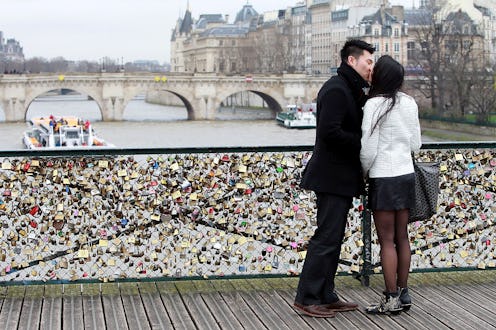Books
7 Très Fascinating French Romantic Women
I have never been to a city as aggressively romantic as Paris. Everything about it seems to remind you that love is awesome and you should be making out with someone RIGHT NOW, dammit! I was single during my visit and my traveling companion's now ex-boyfriend was an ocean away, so we both felt the sting of being a solo woman in the city of love and lights. What is it about Paris that makes you feel like romance is an essential part of the experience?
David Downie would probably argue that romance is in the air in Paris because the city and culture as we know it today is heavily influenced by the Romantics. His new book A Passion for Paris, Romanticism and Romance in the City of Light is a written tour through the Paris of Victor Hugo, Charles Baudelaire, George Sand, and others. He takes us to the spots where these greats wrote, fought, made love, and died (maybe not in that order). It's a tour and a history lesson all in one.
Since Downie's topic is romance in all senses of the word, he obviously spends some time looking at the love lives of our Romantic heroes. They had affairs worthy of the most sordid reality television, yet we don't often talk about the women in their lives. Speaking with a librarian, Downie pondered the role of the Frenchwoman in the largely male-dominated French society. "The librarian agreed, as I have long suspected, that despite the outwardly patriarchal nature of the nation, women secretly rule, women who run households and influence men in family matters, business, and politics and always have..."
I'm always a little squirrely about statements like this. On one hand, there's undoubtedly a lot of truth to it. Throughout history, seemingly powerless women have wielded an immense amount of influence over their husbands and lovers, sometimes so much so that they've been able to essentially exercise power through the man. On the other hand, this idea that the woman always secretly holds all of the power negates the struggle, inequality, and abuse women have faced for centuries and continue to face today. As Downie himself points out, these women were not equal to their Romantic lovers. Leonie d'Aunet was sent to jail for her affair with Victor Hugo, while Hugo walked free. Hugo supported his mistress Juliette so she no longer had to be a prostitute, but he also locked her away from the rest of the world. None of that screams women ruling to me.
There's no denying, however, that the male Romantics needed the women who surrounded them to produce their work. They were lovers, muses, and even sometimes editors to the male writers. And, of course, some of them produced enduring work of their own. It would be great to one day get an entire book looking solely at the women of the French Romantic movement, but until then we can thank Downie for giving us a little crash course on them.
Leonie d'Aunet
d'Aunet was a writer of plays, novels, and travel essays, among other things. She was Hugo's mistress for seven years, and was sent to jail and then a convent when her husband found out about the affair. She once sent Hugo's other longtime mistress, Juliette Drouet, a bundle of love letters that Hugo had written to her to make her jealous. Me-ow.
Louise Colet
Colet was a poetess who had a tumultuous affair with Flaubert. She eventually became the model for Flaubert's Emmaa Bovary. Fun fact: when it was revealed that Colet had cheated on her husband with one of her lovers, she ran across town and stabbed the man who had snitched on her (another of her past lovers).
Marie Dorval
An actress and lover of numerous Romantics, Dorval didn't limit herself to the men. She supposedly tried to seduce Hugo and his mistress Juliette Drouet at the same time, and was somewhat openly a lover of George Sand.
Juliette Drouet
Druet was Hugo's longtime mistress and muse. She was also an actress, a prostitute, and the lover/muse of other artists in Paris. Drouet stayed with Hugo for 50 years, officially acting as his secretary and sometimes-editor.
Jeanne Duval
Also known as the Black Venus, we know practically nothing about Duval. Accounts of her can't even decide what she looks like (some say she was light skinned and Cajun, others say Haitian and dark), but we do know that she was a lover and muse to Baudelaire. A number of poems in The Flowers of Evil are supposedly inspired by her.
George Sand
The fantastically gender-bending George Sand found time to write novels when she wasn't smashing convention in Paris. Her affairs included men and women, and she was often seen strolling around Paris wearing men's clothing and smoking a cigarette. She had a longtime affair with Chopin and once said that she liked to lie underneath his piano while he played. Hot.
Adele Foucher
Adele was Hugo's wife. The two married in their teens and, when Hugo's ego got too large to deal with, she began having an affair with his friend, Charles-Augustin Sainte-Beuve. Hugo was so upset by the affair that he based the Hunchback (you know, of Notre Dame) on Sainte-Beauve and Esmeralda on Adele.
Images: WiffleGif (1); Wikipedia (6); Wikimedia (1)
